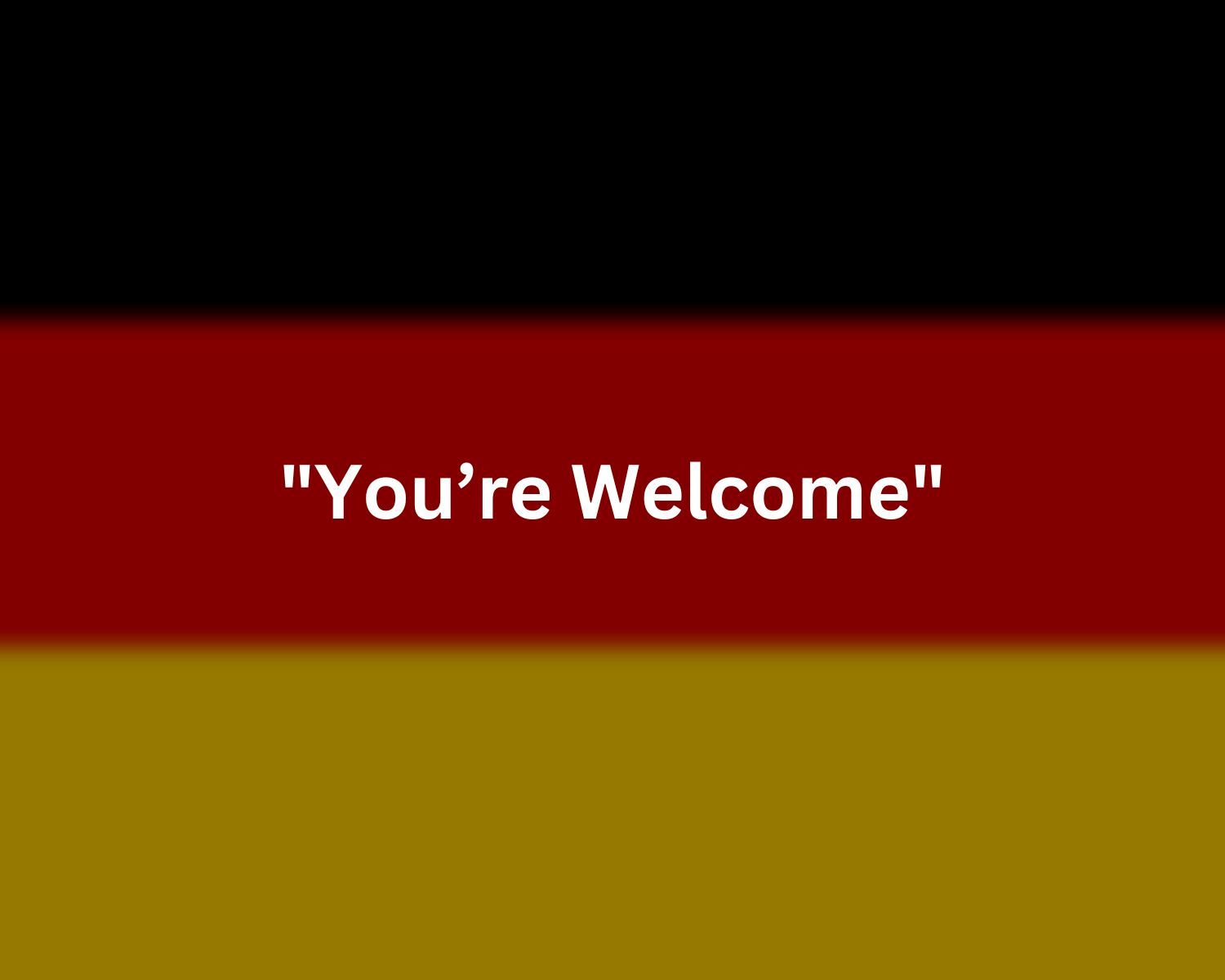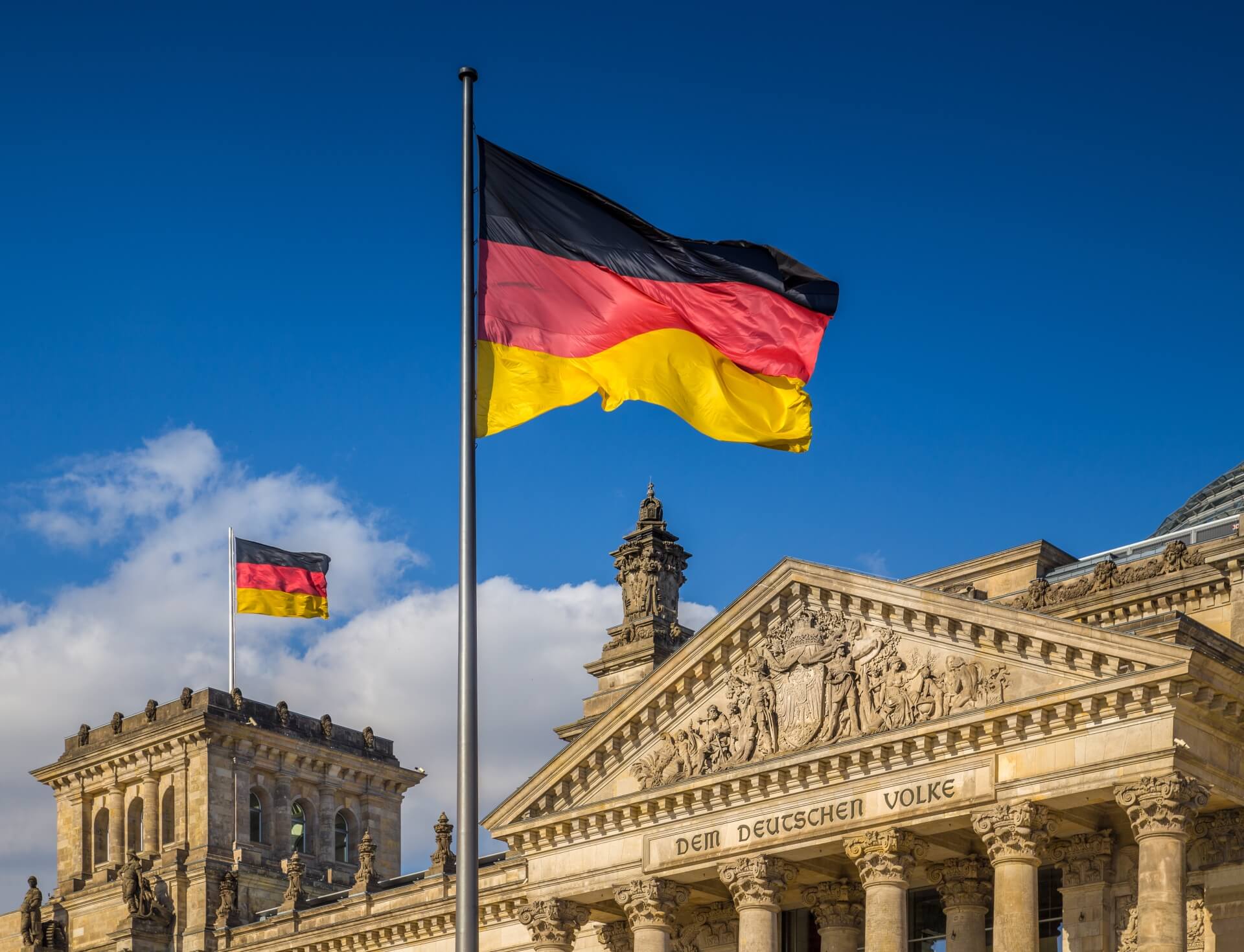Home>Language and Grammar>How To Say ‘You’re Welcome’ In German


Language and Grammar
How To Say ‘You’re Welcome’ In German
Published: February 26, 2024
Learn how to say "you're welcome" in German and improve your language and grammar skills with our helpful guide. Master common phrases and expressions!
(Many of the links in this article redirect to a specific reviewed product. Your purchase of these products through affiliate links helps to generate commission for Regretless.com, at no extra cost. Learn more)
Table of Contents
Introduction
When learning a new language, it's not just about mastering vocabulary and grammar; it's also about understanding the nuances of everyday interactions. One of the most fundamental expressions in any language is "you're welcome." It's a simple phrase, yet it carries a significant weight in social interactions. In this article, we'll explore how to say "you're welcome" in German, delving into the various contexts and forms this expression can take.
Understanding how to express gratitude and acknowledge thanks is essential in any language. It reflects politeness, respect, and a willingness to engage in meaningful communication. In German, as in many other languages, there are different ways to convey "you're welcome" depending on the situation and the level of formality.
As we delve into the intricacies of expressing gratitude in German, we'll uncover the cultural significance behind these phrases. Language is deeply intertwined with culture, and by learning how to say "you're welcome" in German, we gain insight into the customs and social norms of the German-speaking world.
Join me as we embark on a linguistic and cultural journey, exploring the diverse ways to express appreciation and acknowledgment in the German language. Whether you're a language enthusiast, a traveler, or simply curious about different cultures, understanding the nuances of expressing gratitude in German will enrich your language skills and deepen your cross-cultural understanding. Let's dive into the world of German expressions of gratitude and discover the richness of language and culture.
Read more: How To Say ‘Hello’ In Portuguese
Basic Phrases
In German, expressing gratitude and acknowledging thanks is an integral part of everyday communication. When someone says "thank you" in German, the natural response is to reciprocate with a polite acknowledgment. The most common way to say "you're welcome" in German is "bitte" (pronounced "bitt-uh"). This simple yet versatile word carries multiple meanings, including "please," "you're welcome," and "here you go." It exemplifies the efficiency and flexibility of the German language, where a single word can convey various sentiments depending on the context.
Another common phrase to express gratitude in German is "gern geschehen" (pronounced "gehrn geh-shay-en"). This phrase translates to "gladly done" or "happily happened" and is used to convey a sense of willingness and pleasure in helping or accommodating someone. It goes beyond a mere acknowledgment of thanks and reflects a genuine desire to be of assistance.
In informal settings or among friends and family, a casual and friendly way to say "you're welcome" is "kein Problem" (pronounced "kine pro-blehm"), which translates to "no problem." This laid-back expression conveys a relaxed and easy-going attitude, emphasizing that the favor or assistance extended was effortless and not a burden.
For those looking to add a touch of warmth and sincerity to their response, "nichts zu danken" (pronounced "nikts tso dan-ken") is a charming phrase that means "nothing to thank for." This expression conveys a humble and modest acknowledgment of thanks, subtly downplaying the favor or assistance provided.
In addition to these phrases, the German language offers a range of regional variations and dialectal expressions for saying "you're welcome," reflecting the diverse linguistic landscape of the country. From the northern regions of Schleswig-Holstein to the southern reaches of Bavaria, each area boasts its own unique expressions of gratitude, adding depth and richness to the tapestry of German language and culture.
Mastering these basic phrases for expressing gratitude in German lays a solid foundation for meaningful interactions and demonstrates a genuine interest in engaging with the language and culture. Whether you're navigating everyday conversations, traveling through German-speaking regions, or connecting with native speakers, these phrases will serve as invaluable tools for building rapport and fostering positive communication.
As we delve deeper into the nuances of expressing gratitude in German, we'll explore the distinctions between formal and informal situations, uncovering the subtle shifts in language and etiquette that shape social interactions in the German-speaking world. Join me as we unravel the intricacies of expressing appreciation in different contexts, gaining a deeper understanding of the cultural nuances embedded in the German language.
Formal and Informal Situations
In the German language, the distinction between formal and informal situations plays a pivotal role in shaping expressions of gratitude, including how to say "you're welcome." Understanding and navigating these nuances is essential for effective communication in various social settings.
In formal situations, such as professional environments, official gatherings, or when interacting with individuals of higher social status or authority, it is customary to use more formal expressions of acknowledgment. When responding to gratitude in these contexts, the phrase "Bitte sehr" (pronounced "bitt-uh zehr") is commonly employed. This phrase conveys a sense of formality and respect, aligning with the etiquette expected in formal settings. It translates to "you're very welcome" or "here you go," emphasizing a gracious and polite acknowledgment of thanks.
Similarly, the expression "Gern geschehen" maintains its relevance in formal situations, reflecting a willingness to assist or accommodate others with a sense of professionalism and courtesy. This phrase embodies a level of formality while conveying a genuine desire to be of service, making it well-suited for professional interactions and formal settings.
In contrast, informal situations, such as casual gatherings, interactions with friends, or among family members, allow for a more relaxed and familiar tone in expressing gratitude. In these settings, the phrase "Kein Problem" is often used to convey a laid-back and friendly acknowledgment, emphasizing the ease and lack of inconvenience in providing assistance or fulfilling a request.
Additionally, "Nichts zu danken" retains its charm in informal contexts, reflecting a humble and modest response to thanks. This phrase carries a sense of warmth and approachability, making it well-suited for informal exchanges where a casual and genuine acknowledgment is desired.
Understanding the appropriate use of these expressions in formal and informal situations is crucial for navigating social interactions in the German-speaking world. It reflects an awareness of cultural norms and etiquette, showcasing respect and consideration for the nuances of language and communication.
By mastering the nuances of formal and informal expressions of gratitude in German, individuals can effectively navigate diverse social scenarios, build meaningful connections, and demonstrate a nuanced understanding of the cultural fabric woven into the German language. These linguistic subtleties not only enrich communication but also foster a deeper appreciation for the customs and social dynamics prevalent in German-speaking communities.
As we continue to explore the multifaceted ways of expressing gratitude in German, we gain insight into the intricate interplay between language, culture, and social etiquette, further enriching our linguistic and cultural proficiency.
Other Ways to Say 'You're Welcome'
In addition to the commonly used phrases for expressing gratitude in German, there are several other nuanced and culturally rich ways to say "you're welcome" that add depth and warmth to interpersonal interactions. These alternative expressions not only showcase the diversity of the German language but also reflect the values and customs embedded in German-speaking communities.
One such expression is "Nicht der Rede wert" (pronounced "nikt dare ray-duh vairt"), which translates to "not worth mentioning." This phrase conveys a sense of humility and modesty, suggesting that the favor or assistance provided was inconsequential and not deserving of excessive gratitude. It reflects a down-to-earth and unassuming attitude, emphasizing the simplicity and naturalness of the gesture.
For those seeking to convey a more formal and gracious acknowledgment, the phrase "Mit Vergnügen" (pronounced "mit fair-gnue-gen") offers an elegant and refined response to expressions of thanks. This expression, meaning "with pleasure," exudes sophistication and a sense of genuine delight in assisting or accommodating others. It adds a touch of elegance to the interaction, reflecting a gracious and polished demeanor.
In casual and familiar settings, particularly among friends and peers, the phrase "Na klar" (pronounced "nah klar") is often used to convey a casual and friendly acknowledgment of thanks. This colloquial expression, roughly translating to "of course" or "sure thing," embodies a relaxed and easy-going attitude, emphasizing the naturalness and spontaneity of the response.
Furthermore, the expression "Keine Ursache" (pronounced "kine oor-zah-che") serves as a straightforward and direct way to say "you're welcome," conveying a sense of reassurance and understanding. This phrase, meaning "no cause for concern," reflects a reassuring and empathetic tone, reassuring the individual expressing gratitude that their request or thanks was entirely reasonable and warranted.
Exploring these alternative ways to say "you're welcome" in German unveils the rich tapestry of expressions that encapsulate humility, elegance, warmth, and reassurance. Each phrase carries its own distinct charm and conveys subtle nuances of emotion and intention, adding depth and character to interpersonal exchanges.
By embracing these diverse expressions of gratitude, language enthusiasts and learners gain a deeper appreciation for the intricacies of the German language and the cultural values it embodies. These nuanced expressions not only enrich communication but also foster a deeper understanding of the social dynamics and interpersonal nuances prevalent in German-speaking communities.
Conclusion
In conclusion, the diverse ways to say "you're welcome" in German reflect the rich tapestry of language and culture woven into the fabric of German-speaking communities. From formal expressions exuding elegance and respect to casual phrases embodying warmth and familiarity, the nuances of gratitude in German encapsulate the values, etiquette, and social dynamics prevalent in various contexts.
By delving into the intricacies of expressing gratitude in German, we gain a deeper understanding of the cultural significance embedded in everyday interactions. The German language not only serves as a means of communication but also as a reflection of the values and customs cherished by its speakers.
Mastering the art of acknowledging thanks in German goes beyond linguistic proficiency; it signifies an appreciation for the nuances of social etiquette and a genuine interest in engaging with the cultural intricacies of the language. Whether navigating formal settings, casual exchanges, or regional dialects, the ability to express gratitude in German reflects a nuanced understanding of social dynamics and interpersonal communication.
As language enthusiasts and learners embrace the diverse ways to say "you're welcome" in German, they embark on a journey of cultural discovery, gaining insight into the values of humility, elegance, warmth, and reassurance embedded in the language. These nuanced expressions not only enrich communication but also foster a deeper appreciation for the social fabric of German-speaking communities.
In essence, the phrases used to convey "you're welcome" in German serve as gateways to understanding the cultural nuances, social norms, and values cherished by German speakers. They exemplify the intricate interplay between language and culture, offering a glimpse into the diverse tapestry of expressions that shape meaningful interactions and foster cross-cultural understanding.
As we continue to explore the multifaceted ways of expressing gratitude in German, we celebrate the richness of language and culture, embracing the nuances that make each interaction a reflection of respect, warmth, and genuine human connection. Through the art of acknowledging thanks, we bridge linguistic barriers and cultivate a deeper appreciation for the diverse expressions of gratitude that unite us as global citizens.















